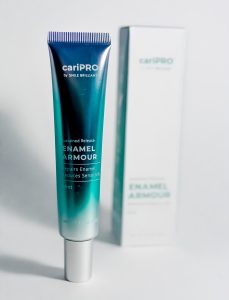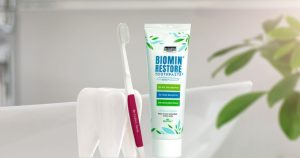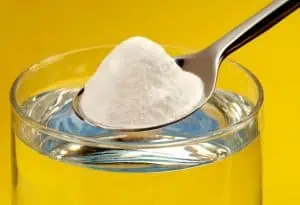If you’ve experienced enamel loss, cavities, and decay, you may be wondering how to remineralize teeth. Remineralization of teeth is certainly possible and it’s as easy as keeping up your normal daily hygiene routine.
If you are interested in knowing what tooth remineralization actually means, how it prevents tooth decay, and the easiest ways to achieve it to optimize your oral health, keep reading!
How can you remineralize your teeth quickly?
First, it’s important to know that enamel damaged by decay cannot simply grow back. However, it is possible to restore the minerals in weakened enamel and make your teeth more resilient to decay. This is a process known as ‘tooth remineralization’.
There are several ways to accomplish tooth remineralization to prevent caries and tooth death and acquire good dental health. Let’s look at them one by one. You may use some home remedies with baking soda and coconut oil to make sure your teeth remain healthy and strong. The whole process of tooth remineralization will also require you to cut down on certain foods, for example, those with phytic acid in them.
When it comes to keeping teeth healthy, you pretty much know the drill: brush them twice a day, floss, and of course, keep yourself miles away from sugary treats and starchy foods. So, it’s naturally frustrating when, even after following this standard advice, you still get tooth decay. What could you possibly still be doing wrong? Probably not paying attention to tooth remineralization.
Remineralization treatment

Our top remineralization treatment is the cariPRO Enamel Armour. This serum goes to the root of tooth problems, like enamel loss caused by aggressive brushing, decay, or whitening treatments, and tooth dehydration caused by smoking and drinking, not enough water, and alcohol-based mouthwash.
It works to:
- Seal pores and repair enamel
- Rehydrate teeth
- Encourage healthy saliva production
- Increase resistance to cavities
It’s also a breeze to use — just put it on your teeth after you finish brushing and flossing at the end of the day, and leave it on while you sleep so it can heal your teeth all night long.
Use a remineralization toothpaste

One effective toothpaste that you can use to remineralize your teeth is Biomin. Biomin contains BioMin® C, which also contains hydroxyapatite.
When mixed with saliva, BioMin® C creates a bio-engineered compound called BIORESTORE™. This has a chemical structure that is similar to tooth enamel, and coats teeth with a protective shield of biofilm.
You can find it on Amazon!
You can also try Uncle Harry’s alkalizing toothpaste for a natural option, or this one from Sensodyne that contains minerals and fluoride, to not only restore the lost minerals in your tooth but also make sure to keep the cavities away.
Fluoride toothpaste
Hydroxyapatite might be the building blocks for your teeth, but it is the mortar that holds the blocks together. In the case of teeth, fluoride is that mortar.
There are two reasons why fluoride toothpaste is the best remineralizing toothpaste for teeth enamel repair: it prevents the loss of minerals from enamel and prevents cavities, and it helps incorporate the hydroxyapatite particles into the teeth when used in combination.
Avoid foods with phytic acid
During the 1930s, a famous dentist named Weston Prince set out to study the dental health of people living in remote areas with little or no contact with civilization. The dentist was astonished to discover how most of these people had good oral health with very rare cases of tooth decay and dental caries.
As he investigated the reason, he stumbled upon a common thread—all these people ate a diet loaded with whole foods like fatty meat, wild-caught fish, vegetables and fruits, and whole-milk dairy products while avoiding certain grains and legumes.
Some studies have shown that diets that are high in grains and phytic acid may cause an increased risk for cavities. This suggests that grain-free diets could be more beneficial to your enamel. However, you can supplement any diet by also eating nutrient-rich vegetables, fruits, grass-fed meats, and fish that are high in Omega-3 oils, as these have been shown to contribute to oral health and overall health.
If you’re concerned about enamel health and cavities, you should also be conscious of your gut health, as oral health and gut health are closely related.
Dr. Randy Martin
What is so wrong with grains and legumes? Despite being very healthy (whole grains), they are rich in phytic acid, a known “anti-nutrient” that binds itself to minerals present in the body such as zinc, calcium, and iron, and prevents their absorption. Simply speaking, the more grains you eat, the more phytic acid your body acquires which ultimately causes damage to the tooth enamel and increases the chances of tooth decay.
So, if your goal is remineralize teeth and protect your enamel, you can try going legume and grain-free for some time to reduce phytic acid levels in the body and give it a chance to absorb all the primary minerals. Until then, you may include whole foods in your daily diet like:

- Grass-fed meats
- Pastured eggs
- Wild-caught fish
- Healthy fats from coconut oil and grass-fed butter
- Organic vegetables
Of course, before making any drastic changes to your diet, it’s always best to consult with your physician.
Heal your gut with probiotics
Consuming mineral-rich foods is not the only way to strengthen and remineralize your enamel. There are many other things that you may consider adding to your diet for a healthy mouth; one of which is probiotics.
Probiotics refer to the good bacteria present in your gut which not only protect your digestive system but can also reverse tooth demineralization and prevent cavities. This must not come as a surprise, especially after the release of studies like this one that demonstrate how almost every disease in the body can be linked to gut issues.
But why should you include probiotics as a part of your oral care? What part do they play in remineralizing teeth?
Probiotics decrease the number of Mutans streptococcus, a kind of bacteria found in the mouth that plays a primary role in tooth decay. Additionally, they also keep your gut healthy which means it is better able to absorb the majority of nutrients and minerals.
According to recent studies, the following probiotic strains can help you maintain healthy teeth:
- Lactobacillus reuteri
- Lactobacillus salvarius
- Lactobacillus rhamnosus
- Bifidobacterium animalis
Remember to include a high-quality probiotic supplement with the above-mentioned strains in your daily diet.
Get more vitamin D
Vitamin D is an important nutrient, not only for your dental health but also for other body systems. It helps the body to absorb calcium which strengthens teeth. While most of us are well aware of its importance, not many people make sure to get enough of this vitamin.
Scientists have found that supplementing your body with vitamin D can greatly reduce the likelihood of getting cavities.
You may also consider taking vitamin K2 after seeking appropriate medical advice as it considerably enhances the absorption of vitamin D.
Use baking soda
Baking soda is an extremely popular and effective home remedy to whiten teeth. It has even been recommended by dentists as a safe natural alternative to commercial teeth whiteners. Did you know that baking soda can also help you prevent cavities and maintain good oral hygiene?

What’s more, baking soda also reduces acidity in the mouth which may otherwise disrupt the layer of minerals naturally deposited on the enamel of a tooth. A reduced acidity level also makes it easier for fluoride toothpaste to remineralize and rebuild the enamel.
So if you think your teeth need a quick remineralization, all you need to do is mix one tablespoon of baking soda with four ounces of water and swish it around your mouth once daily.
Perform coconut oil pulling
Oil pulling is a famous Ayurvedic practice that not only strengthens the gums and teeth, and freshens the breath but also helps remineralize teeth and prevent tooth decay. Numerous studies have proven that using oil can clear away harmful bacteria, such as streptococcus mutans, which normally reside in the saliva and plaque.
Just take one tablespoon of coconut oil and swish it in your mouth for 20 seconds per day. The traditional Ayurveda recommends using sesame oil but for most people, coconut oil is a better choice as it has a better taste.
Watch the following video that shows how one woman remineralizes her teeth naturally:
Try Xylitol
Xylitol refers to a natural sweetener that comes from the birch tree. In addition to sweetening up your everyday foods, xylitol is also considered an important substance to remineralize teeth, protect the enamel, and prevent translucent teeth. Xylitol helps maintain good dental health in a number of ways:
- It kills bacteria by starving them to death
- It greatly increases the absorption of calcium
- It raises the pH of salvia making it more favorable for remineralization
Talk to your dentist about how much xylitol you can safely consume to remineralize teeth in the fastest way possible.
How does tooth remineralization help?
The biggest reason why you should remineralize teeth is that it helps reverse tooth decay and reduces the likelihood of cavities. The list certainly does not end here. Teeth remineralization can also:
- Decrease tooth sensitivity
- Control pain caused by decay
- Improve overall oral hygiene
- Restore the functions of damaged teeth
- Cut down lifetime dental costs
Plus, it also positively impacts your overall health and may markedly improve your quality of life.
Maximizing tooth remineralization
Below are certain things that you can do to maximize tooth remineralization and fight off cavities:
Do not dabble
Be in control of your dental health by forming habits that automatically promote remineralization. Instead of searching for a quick fix, find sustainable solutions that you may adapt to your lifestyle.
Begin early
Remember that the habits that promote remineralization also play an important role in the healthy formation of teeth, and this goes for both temporary and permanent sets of teeth. So, it is better if you start early.
If you’re looking for ways to take better care of your teeth, we recommend using an electric toothbrush like the CariPRO Ultrasonic. 40,000 vibrations per minute and a built-in timer make sure you optimize your oral hygiene. Find out more in our full review of the cariPRO Ultrasonic toothbrush.
Stay hydrated
Hydration plays an important role when it comes to producing saliva. It is also your primary defense against plaque and cavities. Therefore, make sure to drink at least eight glasses of water every day.
Live healthily
Get enough sleep, control your stress levels, and exercise on a daily basis. These three factors not only promote the general health of the body but also have indirect impacts on your teeth by regulating hormones and running all the body systems effectively.
Eating disorders like bulimia also negatively impact enamel, causing a condition known as bulimia teeth—another reason to seek help.
Cheat strategically
Even if you decide to have cheat days, do it strategically. For example, if you wish to drink a can of soda that severely cripples the remineralization process, try finishing it quickly at once instead of sipping it throughout the day.
Talk to your dentist
Even if you wish to stick to natural remedies to mineralize your teeth, do not forget to stay in touch with your dentist. Your dentist can help you with tracking your progress and documenting your results in addition to helping you gain access to products you may not find over the counter.
Conclusion

Teeth experience daily wear and tear and may at some require remineralization. Luckily, you can easily accomplish this at home with remedies like baking soda, vitamin D, probiotics, and mineralizing toothpaste containing fluoride and hydroxyapatite.
Have a look at the table below for a summary of things you can do to remineralize your teeth.
| Oral hygiene | Diet | Lifestyle |
| Baking soda rinse | Foods low in phytic acid | Get enough sleep |
| Remineralizing toothpaste with fluoride | Organic vegetables | Exercise a little bit every day |
| Incorporate xylitol into your routine | Healthy fats | Drink 8 glasses of water every day |
Don’t forget to be in touch with your dentist to track progress and keep a check on the results.
FAQs
Can you rebuild the enamel on your teeth?
It is not possible to regenerate enamel. Unlike bone or skin, it’s a non-organic tissue that lacks growing properties. There is no other source of enamel in the body that can be used for grafting. Luckily, you might be able to strengthen damaged enamel by using remineralization products.
What can I eat to remineralize my teeth?
Foods rich in calcium, such as almonds, cheese, milk, and leafy green vegetables, can be eaten for mineralizing your teeth. Additionally, phosphorus-rich foods like eggs and fish may also help.
Can baking soda remineralize teeth?
While baking soda does not directly mineralize teeth, it may aid the process. It reduces mouth acidity, which would otherwise disrupt natural mineral deposits on the enamel of a tooth. A reduced acidity level also makes it easier for fluoride toothpaste to remineralize and rebuild the enamel.
Can you reverse a cavity?
A cavity is formed due to the loss of minerals from the enamel. This is definitely reversible in the early stages with the help of different remedies like baking soda, fluoride toothpaste, and probiotics. However, if the process of tooth decay continues, more minerals keep getting lost, weakening the enamel, deepening the cavity, and causing tooth pain. At this stage, the cavity becomes irreversible and can only be repaired with a filling.
Annali di stomatologia: Nano-hydroxyapatite and its applications in preventive, restorative and regenerative dentistry: a review of literature. Consulted 26, January, 2020.
Journal of Indian Society of Pedodontics and Preventive Dentistry: Effect of oil pulling on Streptococcus mutans count in plaque and saliva using Dentocult SM Strip mutans test: a randomized, controlled, triple-blind study. Consulted 26, January, 2020.
Nutrition reviews: Vitamin D and dental caries in controlled clinical trials: systematic review and meta-analysis. Consulted 26, January, 2020.
Caries Research: Effect of long-term consumption of a probiotic bacterium, Lactobacillus rhamnosus GG, in milk on dental caries and caries risk in children. Consulted 26, January, 2020.
British Medical Journal: Remarks on the influence of a cereal-free diet rich in vitamin D and calcium on dental caries in children. Consulted 20th March 2020.
Oregon State University: Gut bacteria’s connections to human health, disease. Consulted 26 January 2020.
Journal of electron microscopy: Remineralization effects of xylitol on demineralized enamel. Consulted 26, January, 2020.
International Journal of Endocrinology: The Synergistic Interplay between Vitamins D and K for Bone and Cardiovascular Health: A Narrative Review. Consulted 20 March 2020.
Annali di stomatologia: Nano-hydroxyapatite and its applications in preventive, restorative and regenerative dentistry: a review of literature. Consulted 26, January, 2020.
Journal of Indian Society of Pedodontics and Preventive Dentistry: Effect of oil pulling on Streptococcus mutans count in plaque and saliva using Dentocult SM Strip mutans test: a randomized, controlled, triple-blind study. Consulted 26, January, 2020.
Nutrition reviews: Vitamin D and dental caries in controlled clinical trials: systematic review and meta-analysis. Consulted 26, January, 2020.
Caries Research: Effect of long-term consumption of a probiotic bacterium, Lactobacillus rhamnosus GG, in milk on dental caries and caries risk in children. Consulted 26, January, 2020.
British Medical Journal: Remarks on the influence of a cereal-free diet rich in vitamin D and calcium on dental caries in children. Consulted 20th March 2020.
Oregon State University: Gut bacteria’s connections to human health, disease. Consulted 26 January 2020.
Journal of electron microscopy: Remineralization effects of xylitol on demineralized enamel. Consulted 26, January, 2020.
International Journal of Endocrinology: The Synergistic Interplay between Vitamins D and K for Bone and Cardiovascular Health: A Narrative Review. Consulted 20 March 2020.




